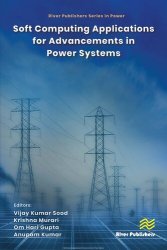Soft Computing Applications for Advancements in Power Systems
- Добавил: literator
- Дата: 6-11-2024, 21:18
- Комментариев: 0
 Название: Soft Computing Applications for Advancements in Power Systems
Название: Soft Computing Applications for Advancements in Power SystemsАвтор: Vijay Kumar Sood, Krishna Murari, Om Hari Gupta, Anupam Kumar
Издательство: River Publishers
Год: 2024
Страниц: 293
Язык: английский
Формат: pdf (true)
Размер: 11.9 MB
This book discusses real applications of Soft Computing (SC) in power systems. These SC techniques, inspired by the human mind and biological behavior, have proven to be excellent tools to overcome the challenges faced in power systems and related areas. The techniques are robust and provide low-cost solutions while also offering an effective solution for studying and modeling the behavior of renewable energy generation, operation of grid-connected renewable energy systems, and sustainable decision-making among alternatives. The tolerance of SC techniques to imprecision, uncertainty, partial truth, and approximation makes them highly useful alternatives to conventional techniques.
The rapid growth in SC techniques plays an important role in powerful representation, modeling paradigms and optimization mechanisms for solving power system issues such as power quality, reactive power control, oscillation and stability problems, renewable energy resource eval-uation, design of energy efficiency systems, economic load dispatch problems or very different energy system applications in smart grids.
Some important branches of soft computing techniques are neural networks, fuzzy logic, evolutionary computation, probabilistic reasoning, etc. A neural network can learn and adapt as per requirements. Fuzzy logic is based on an expert’s knowledge and evolutionary computation is established on Darwin’s principle of “survival of the fittest strategy” and genetic evolution. The Soft Computing techniques are highly robust, adaptable, and low cost. Furthermore, it is observed that soft computing techniques are also applicable in different fields such as robotics, aerospace, pattern classification and recognition, medical applications, market prediction, power system applications, etc.
In power system applications, soft computing techniques play a crucial role for controlling, identification, predicting, etc. The role model of soft computing techniques is the human mind that can argue, learn from experience, and take human-like decisions. The principal member of soft computing technique comprises fuzzy logic systems (FLS), artificial neural networks (ANNs), nontraditional optimization techniques, Machine Learning, etc. Presently, soft computing has enlarged its coverage to include swarm intelligence, artificial life, ant behaviours, bio-inspired, chaos theory, learning theory, etc. Soft computing techniques have recently become a well-known tool for solving many engineering problems; for example, they have been used in many areas, namely electrical, electronics, computer engineering, and medical fields.
A genetic algorithm begins by acquiring a group of candidate individuals to create a population of compatible solutions. It mimics natural selection wherein the individuals of an arbitrary generation are selected for reproduction with the idea to obtain superior/desirable offspring for the subsequent generations. In a more general sense, a genetic algorithm is a powerful tool that can be employed to crack constrained and unconstrained optimization problems. It frequently changes a population to pick individuals from the parents and use them to produce the next offspring. Over iterations, the population “grows/evolves” towards the optimal solution. Moreover, a genetic algorithm can be utilized to solve optimization problems not well suited for standard optimization algorithms like gradient descent that struggle to optimize nondifferentiable objective functions. A genetic algorithm is generally used to optimize discontinuous, nondifferentiable, stochastic, or highly nonlinear objective functions. Mathematical optimization methods are remarkable in their own implementation, but they are restricted when the number of governing parameters increases. That’s where genetic algorithms shine.
Скачать Soft Computing Applications for Advancements in Power Systems
Внимание
Уважаемый посетитель, Вы зашли на сайт как незарегистрированный пользователь.
Мы рекомендуем Вам зарегистрироваться либо войти на сайт под своим именем.
Уважаемый посетитель, Вы зашли на сайт как незарегистрированный пользователь.
Мы рекомендуем Вам зарегистрироваться либо войти на сайт под своим именем.
Информация
Посетители, находящиеся в группе Гости, не могут оставлять комментарии к данной публикации.
Посетители, находящиеся в группе Гости, не могут оставлять комментарии к данной публикации.
